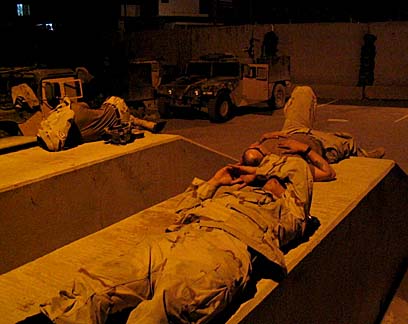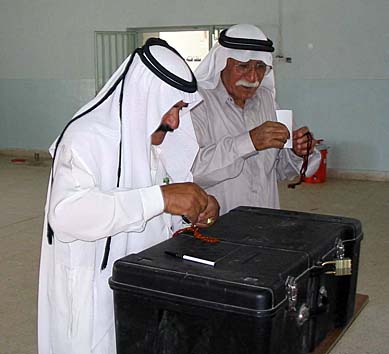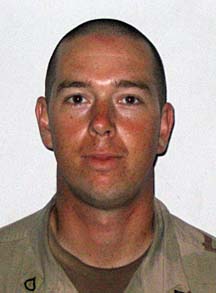

|
A Soldier’s Story First Sgt. Robert Jennings |
See also: In the Military
Troops start plans
to fight insurgencies"Information angel" update >> It seems that Spc. Charles Woolwine is continuing his prosthesis rehabilitation ahead of schedule. This is something that does not surprise those of us who know the "machine." He's gaining weight and is well on his way on the road to recovery.
We have not received any updates on any of the other soldiers, so we assume they are continuing with their rehabilitation also. Keep it up boys, you all seem to come up in daily conversation here and you're missed by all of us.
This week, we have been out in force and it seems to have paid off. We all have seen the news and know what is happening all over the country as we get closer to June 30 -- the day the interim government takes control of the country.
Here in Kirkuk, we have implemented our plan to counter any insurgencies. We all pray that we can transition with the new Iraqi government as smoothly as possible.
Soldiers try to get some sleep prior to an early morning mission. In Kirkuk, they have implemented plans to counter any insurgencies in preparation for the transition to the new Iraqi government.
One plan we have implemented is training a special police force to assume security of the Kirkuk government building (city hall).These officers were hand-picked by their police chiefs to represent their communities. You could say it's the who's who of the police force.
It seems the trend lately is for these insurgents to take control of city government buildings and police stations. They feel if they own them, then they own the city.
Over the past month, we have had a special international police training team working with these selected officers. I, along with other leaders here, feel this has been a major deterrent for the insurgent forces we hear about around the country.
Citizens of Amu Shabi take part in the election of their Mukhtar. The Mukhtar is like the mayor of the village, and is usually an elder that everyone looks up to. The election was not government-sponsored.
We ended the week with what I think has been the most significant event to date. The small village of Amu Shabi held free elections with the help of police and coalition forces. They elected their new Mukhtar. The Mukhtar is kind of like the mayor of the village. He is responsible for right and wrong of everyone there. It is usually an elder that everyone looks up to.Their prior Mukhtar was a huge Baathist Party supporter and fled just as Kirkuk was falling to the coalition. Since then, they have not had proper leadership in the community.
They decided to do this election a few weeks ago and we have been working hand and hand with them in support. They told me about the last election, when Saddam won with 100 percent of the vote. A person would knock on the door and ask them if they wanted to vote for Saddam: yes or no. Then they were handed a ballot and were guided to circle "yes."
The citizen that won was definitely the people's choice. Out of six candidates, he received 40 percent of the vote. The best part of this election is that it was not government-sponsored.
This was decided on by the people.
They elected who they wanted to represent them, and now they have someone they can turn to for representation in the city.
As far as anyone here knows, this was the first election of its kind. This is a huge step and just goes to show how much this country really wants to change.
God Bless and Aloha.
BACK TO TOP |
Machine gunner loves the danger
Pfc. Scott Kramer
This week, meet Pfc. Scott Kramer, an assistant M240 machine gunner for 1st Platoon.
He is from Petaluma, Calif., and has been in the Army for 15 months. He has also pulls duties as a rifleman for 2nd Squad, 1st Platoon, when no machine gun is needed.
Kramer thought the deployment was going to be way different than it has been. "I thought we would be living in tents or on the ground like we train. I never thought we would be living in the houses in the city."
He added: "I think we've come a long way, and so have the Iraqi forces we have been working with. You can definitely see the improvement."
I asked Kramer what the most enjoyable part of the deployment has been. "I love doing the dangerous missions. When we receive an order and start rehearsals right away, I always get that huge adrenaline rush just as we are about to get on top of our objective."
When I asked him what the hardest part of the deployment has been, he said: "Working all the time. It seems you're always on call to move, so it's hard to get comfortable and get good uninterrupted sleep. I don't want to seem like I'm complaining, because I'm not. I know we have a job to do here and if there was a difficult moment that would be it."
He finished his interview by saying hi to his parents, Norman and Diana, brothers Rob and Rick, and sister Danielle back in California. "I love you guys and I hope to see you soon."
First Sgt. Robert Jennings
1st Sgt. Robert Jennings is deployed in Iraq with 4,000 25 Infantry Division (Light) soldiers from Schofield Barracks. He writes a Sunday column for the Star-Bulletin that began Feb. 1. Jennings, a 20-year Army veteran, has been assigned to Fort Riley, Kan., Fort Campbell, Ky., Fort Lewis, Wash., and Camp Casey in South Korea. He is now on his second tour at Schofield Barracks. He has been deployed to Panama, Japan, Germany, Egypt and Thailand. As the first sergeant of Alpha Company, Jennings is in charge of 135 soldiers.
See the Columnists section for Jennings' earlier dispatches.


